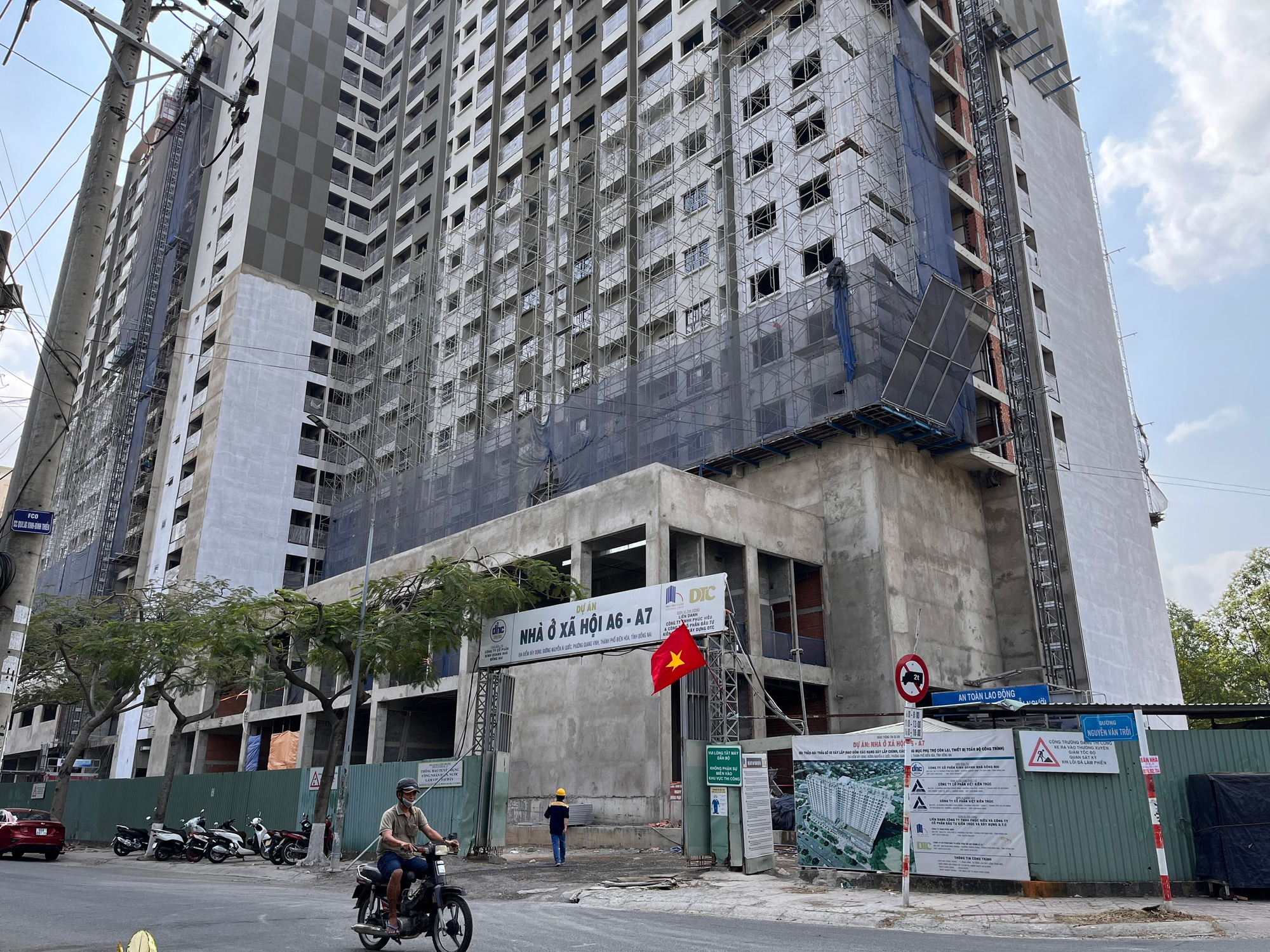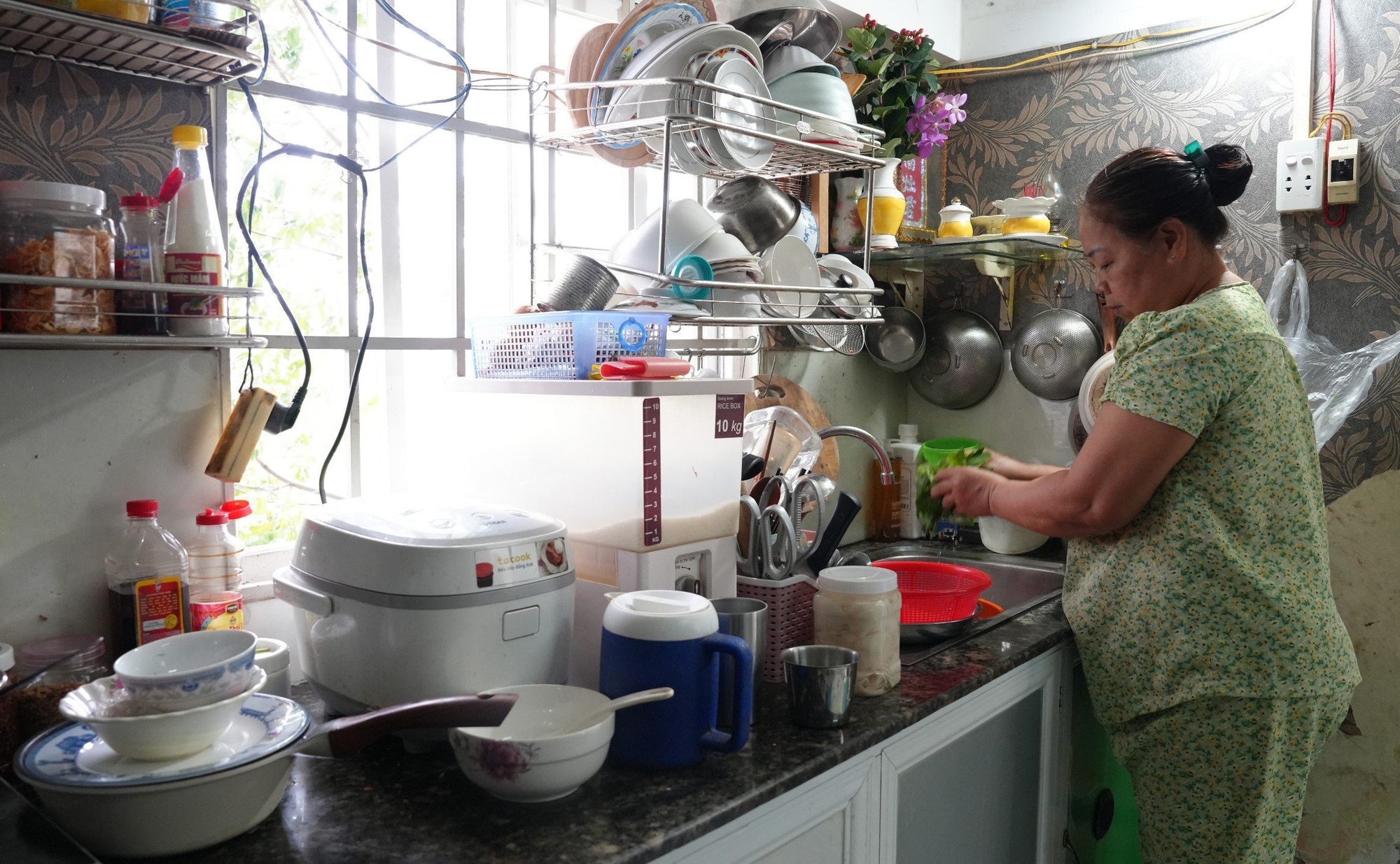Housing development policies need to be improved to enhance the quality of life
In order to improve the quality of life for people, housing development policies, particularly social housing for low-income individuals in urban areas, as well as housing for workers in industrial clusters, need to be implemented vigorously and systematically.

The social housing project A6-A7 (Quang Vinh Ward, Bien Hoa City, Dong Nai Province) is expected to be completed and put into use in early 2025. Photo: NGUYEN TUAN
Still facing many challenges
Having contacted social housing developers in Binh Duong province, it is clear that verifying the eligibility to purchase social housing is currently quite complex and cumbersome, causing difficulties for the people. For example, a company in Di An City, Binh Duong Province, despite completing the social housing project’s roof in June 2023, has only been able to approve a few dozen of the purchased files. While the house sale conditions have been met and the buyers have lined up, they have encountered various obstacles. Especially, the condition to determine low-income individuals in major cities is that all members of the household must have income that is not subject to personal income tax (i.e. not exceeding 11 million dong/month), which is outdated and a major hindrance. This also poses financial difficulties for companies.
“We have made many recommendations and the provincial People’s Committee, as well as relevant agencies, have provided support and created favorable conditions, but this is a general regulation, so companies still have to wait for resolution,” said a company representative.
Mr. Vo Hoang Ngan, Director of the Department of Construction of Binh Duong Province, stated that according to current regulations, individuals who are entitled to social housing benefits must meet certain conditions, such as not owning a house, residing in the province, and having income that is not subject to personal income tax.
After meeting these conditions, the company submits the buyer’s file to the Department of Construction for verification. Subsequently, the Department of Construction provides all the information to the Department of Natural Resources and Environment as well as local authorities to verify if the buyer already owns a house or land.
“Completing all these procedures takes a lot of time, so the department is proposing to shorten the time and simplify the process to make social housing development more convenient for both project developers and homebuyers,” said Mr. Ngan.
In Ba Ria – Vung Tau province, local authorities have implemented incentives for housing developers, such as exempting land use fees and rent, setting aside 20% of the residential land within the social housing project for commercial housing investment to offset investment costs, reduce selling prices, and rental prices of social housing; exempting or reducing value-added tax, corporate income tax; supporting a portion or the entire investment capital for technical infrastructure construction; providing loans from policy banks and development funds with low interest rates.
However, according to some companies in Ba Ria – Vung Tau province, despite enjoying many incentives, there are still many barriers that prevent them from accessing social housing development projects. For example, difficulties in land clearance have led to prolonged projects, or many investment procedure regulations that discourage companies.
Regarding local authorities, they also consider the social housing development incentives to be unreasonable and lacking balance between state benefits and responsibilities, businesses, and citizens. Most of the incentives are focused on supporting homebuyers and tenants, but not for developers (most of the incentives aim to reduce product costs), which is causing hesitation among developers in the field of social housing development.
The Provincial People’s Committee of Ba Ria – Vung Tau province has planned housing development on the province’s territory for low-income individuals and workers in industrial zones in the period of 2023-2025. According to the plan, by 2025, the province will implement 17 social housing projects with a scale of 54.3 hectares, accommodating 12,798 units. In the 2023-2025 period, the province plans to allocate around 10,439 billion VND from the state budget and mobilize funds outside the state budget to complete social housing development.
The Provincial People’s Committee of Ba Ria – Vung Tau province has proposed that the Department of Construction urgently advise the province to approve the “Program for social housing development for workers and laborers until 2030, and vision until 2045”. The Provincial Department of Finance estimates the annual state budget for social housing projects for low-income individuals and workers in industrial zones and coordinates the review of plans for price, rental, rent-to-own, and sale prices for social housing projects invested by the state budget as regulated by law on pricing.
Mr. Nguyen Cong Vinh, Vice Chairman of the Provincial People’s Committee of Ba Ria – Vung Tau province, stated that the province encourages economic entities to participate in housing development to meet the housing needs of the people. At the same time, there are policies to support housing for social policy beneficiaries, low-income individuals, and individuals facing housing difficulties in order to contribute to political stability, ensure social security, and develop civilized and modern urban and rural areas.

People living in the social housing project Becamex Dinh Hoa in Thu Dau Mot City, Binh Duong Province. Photo: NGUYEN THAO
Investment in hundreds of thousands of social housing units
According to the “Investment in the construction of at least 1 million affordable housing units for low-income individuals and workers in industrial zones in the 2021-2030 period” project by the Government, Binh Duong has been assigned a target of developing 86,877 units. However, with the forecast of an increasing labor force, Binh Duong is constructing the “Development program of social housing, worker housing in the 2021-2025 period, with a vision to 2030”, with the aim of building around 173,000 units, double the target set by the Government.
Mr. Nguyen Van Loi, Secretary of the Provincial Party Committee of Binh Duong, suggested that the entire political system urgently implement investment in social housing and housing for workers according to the Resolution of the Provincial Party Committee, to achieve the set goals by 2030.
A representative of the Department of Construction of Dong Nai Province said that in the 2021-2025 period, the locality set a target to build 10,000 units of social housing and worker housing to help low-income workers achieve their aspiration of having their own homes.
So far, localities have submitted project proposals for 11 projects, with a scale of approximately 20,000 units. Of these, 5 projects have been approved in principle by the provincial People’s Committee, with a scale of around 9,000 units; 6 projects have not been approved yet, with a scale of around 11,000 units. Out of the 5 approved projects, the Department of Planning and Investment has carried out bidding documents to select investors for around 3,500 units in Bien Hoa City and Nhon Trach district.
In addition, there are currently 3 social housing and worker housing projects under construction in the province, with approximately 2,000 apartments, including the social housing project in Bao Vinh Ward (Long Khanh City); the social housing project A6-A7 in Quang Vinh Ward (Bien Hoa City); and the worker apartment building project in Bau Xeo Industrial Zone (Trang Bom District). In 2024, the Department of Construction of Dong Nai Province aims to complete and put into use more than 700 social housing units. In 2025, the province plans to build an additional 8,340 social housing units.
Mr. Ho Van Ha, Director of the Department of Construction of Dong Nai Province, said that for plots of land that meet the criteria for submitting investment proposals, the department has requested local authorities to promptly complete the dossiers for evaluation and approval by the Department of Planning and Investment, which serve as the basis for bidding and selecting investors.
According to Ha, to expedite the progress of formulating and approving investment proposals for social housing projects, avoiding wastage of state budget resources, local authorities should not organize the detailed planning of 1/500 for projects until the project investor is determined (the project investor is responsible for formulating, evaluating, and submitting the 1/500 planning according to regulations).
The Ba Ria – Vung Tau Provincial People’s Committee has planned for the development of social housing in the province for the period of 2023-2025, targeting low-income earners and workers in industrial zones. According to the plan, by 2025, the province will implement 17 social housing projects with a scale of 54.3 hectares, accommodating 12,798 units. In the 2023-2025 period, the province plans to allocate around 10,439 billion VND from the state budget and mobilize funds outside the state budget to complete social housing development.
The Ba Ria – Vung Tau Provincial People’s Committee proposes that the Department of Construction urgently advise the province to approve the “Program for the development of social housing for workers and laborers until 2030, with a vision until 2045.” The Provincial Department of Finance estimates the annual state budget for social housing projects for low-income individuals and workers in industrial zones; coordinates the review of plans for price, rental, rent-to-own, and sale prices for social housing projects invested by the state budget as regulated by law on pricing.
Mr. Nguyen Cong Vinh, Vice Chairman of the provincial People’s Committee of Ba Ria – Vung Tau, stated that the province encourages economic components to participate in housing development to meet the housing needs of the people. At the same time, there are policies to support housing for social policy beneficiaries, low-income individuals, and individuals in housing difficulties in order to contribute to political stability, ensure social security, and develop urban and rural areas in a civilized and modern direction.

People living in the social housing project Becamex Dinh Hoa in Thu Dau Mot City, Binh Duong Province. Photo: NGUYEN THAO
Insufficient supply to meet the demand
According to the Department of Labor, Invalids and Social Affairs of Dong Nai Province, the total number of workers in industrial zones in the province is approximately 410,597, and they have a housing demand. However, the current social housing and worker housing projects only meet about 6.5% of the demand, and the rest are still living in rented accommodation. It is estimated that by 2025, there will be around 450,000 workers in industrial zones in need of housing.
According to statistics, there are about 72,000 workers in Ba Ria – Vung Tau province, and the majority of them are living in rented accommodation. The housing demand for workers in industrial zones is high, but the overall supply is still insufficient. In recent years, companies in the province have invested in the construction and completion of 13 affordable housing projects with a total floor area of about 120,000 square meters. However, only 1,722 units have been allocated for these projects, serving more than 5,000 workers.












